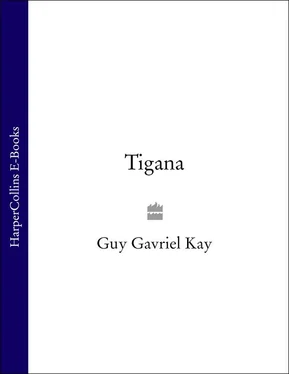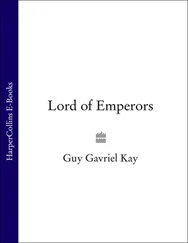1 ...7 8 9 11 12 13 ...41 It was autumn of course, and the Ember Days were coming on: Devin wasn’t surprised by her hair. He was surprised to see the clergy there for the audition. They made him uncomfortable—another legacy of his father— but this wasn’t a situation where he could allow that to affect him, and so he dismissed them from his thoughts.
He focused on the Duke’s elegant son, the only one who really mattered now. He waited, reaching as Menico had taught him for a still point inside himself.
Menico cued Nieri and Aldine, the two thin dancers in their grey-blue, almost translucent, chemises of mourning and their black gloves. A moment later, after their first linked pass across the floor, he looked at Devin.
And Devin gave him, gave them all, the lament for Adaon’s autumnal dying among the mountain cypresses, as he never had before.
Alessan di Tregea was with him all the way with the high, heart-piercing grief of the shepherd pipes and together the two of them seemed to lift and carry Nieri and Aldine beyond the surface steps of their dance across the recently swept floor and into the laconic, precise articulation of ritual that the ‘Lament’ demanded and was so rarely granted.
When they finished, Devin, travelling slowly back to the Sandreni Palace from the cedar and cypress slopes of Tregea where the god had died—and where he died again each and every autumn—saw that Sandre d’Astibar’s son was weeping. The tracks of his tears had smudged the carefully achieved shadowing around his eyes—which meant, Devin realized abruptly, that he hadn’t wept for any of the three companies before them.
Marra, young and intolerantly professional, would have been scornful of those tears, he knew: ‘Why hire a mongrel and bark yourself?’ she would say when their mourning rituals were interrupted or marked by displays from their patrons.
Devin had been less stern back then. And was even less so now since she’d died and he had found himself rather desperately fighting back a shameful public grief when Burnet di Corte had led his company through her mourning rites in Certando as a gesture of courtesy to Menico.
Devin also knew, by the smouldering look the Sandreni scion gave him from within the smeared dark rings around his eyes, and the scarcely less transparent glance from Morian’s fat-fingered priest—why in the name of the Triad were the Triad so ill-served!—that though they might have just won the Sandreni contract he was going to have to be careful in this palace tomorrow. He made a mental note to bring his knife.
They had won the contract. The second number hardly mattered, which is why cunning Menico had begun with the ‘Lament’. Afterwards Menico carefully introduced Devin as his partner when Sandre’s son asked to meet him. He turned out to be the middle son of three, named Tomasso. The only one, he explained huskily, holding one of Devin’s hands tightly between both his own, with an ear for music and an eye for dance adequate to choosing performers equal to so august an occasion as his father’s funeral rites.
Devin, used to this, politely retrieved his fingers, grateful for Menico’s experienced tact: presented as a partner he had some slight immunity from overly aggressive wooers, even among the nobility. He was introduced to the clergy next, and promptly knelt before Adaon’s priestess in red.
‘Your sanction, sister-of-the-god, for what I sang, and for what I am asked to do tomorrow.’
Out of the corner of his eye he saw the priest of Morian clench his chubby, ringed fingers at his sides. He accepted the blessing and protection of Adaon—the priestess’s index finger tracing the god’s symbol on his brow—in the knowledge that he had successfully defused one priest’s burgeoning desire. When he rose and turned, it was to catch a wink—dangerous in that room and among that company—from Alessan di Tregea, at the back with the others. He suppressed a grin, but not his surprise: the shepherd was disconcertingly perceptive.
Menico’s first price was immediately accepted by Tomasso d’Astibar bar Sandre, confirming in Devin’s mind what a sorry creature he was to bear such a magnificent name and lineage.
It would have interested him—and led him a step or two further down the hard road towards maturity—to learn that Duke Sandre himself would have accepted the same price, or twice as much, and in exactly the same manner. Devin was not quite twenty though, and even Menico, three times his age, would loudly curse himself back at the inn amid the celebratory wine for not having quoted even more than the extortionate sum he had just received in full.
Only Eghano, aged and placid, softly drumming two wooden spoons on their trestle table, said, ‘Leave well enough. We need not hold out a greedy palm. There will be more of these from now on. If you are wise you’ll leave a tithe at each of the temples tomorrow. We will earn it back with interest when they choose musicians for the Ember Days.’
Menico, in high good humour, swore even more magnificently than before, and announced a set intention to offer Eghano’s wrinkled body as a tithe to the fleshy priest of Morian instead. Eghano smiled toothlessly and continued his soft drumming.
Menico ordered them all to bed not long after the evening meal. They’d have an early start tomorrow, pointing towards the most important performance of their lives. He beamed benevolently as Aldine led Nieri from the room. The girls would share a bed that night, Devin was sure, and for the first time, he suspected. He wished them joy of each other, knowing that they had come together magically as dancers that afternoon and also knowing—for it had happened to him once—how that could spill over into the candles of a late night in bed.
He looked around for Catriana but she had gone upstairs already. She’d kissed him briefly on the cheek though, right after Menico’s fierce embrace back in the Sandreni Palace. It was a start; it might be a start.
He bade good night to the others and went up to the single room that was the one luxury he’d demanded of Menico’s tour budget after Marra had died.
He expected to dream of her, because of the mourning rites, because of unslaked desire, because he dreamt of her most nights. Instead he had a vision of the god.
He saw Adaon on the mountainside in Tregea, naked and magnificent. He saw him torn apart in frenzy and in flowing blood by his priestesses— suborned by their womanhood for this one autumn morning of every turning year to the deeper service of their sex. Shredding the flesh of the dying god in the service of the two goddesses who loved him and who shared him as mother, daughter, sister, bride, all through the year and through all the years since Eanna named the stars.
Shared him and loved him except on this one morning in the falling season. This morning that was shaped to become the harbinger, the promise of spring to come, of winter’s end. This one single morning on the mountain when the god who was a man had to be slain. Torn and slain, to be put into his place which was the earth. To become the soil, which would be nurtured in turn by the rain of Eanna’s tears and the moist sorrowings of Morian’s endless underground streams twisting in their need. Slain to be reborn and so loved anew, more and more with each passing year, with each and every time of dying on these cypress-clad heights. Slain to be lamented and then to rise as a god rises, as a man does, as the wheat of summer fields. To rise and then lie down with the goddesses, with his mother and his bride, his sister and his daughter, with Eanna and Morian under sun and stars and the circling moons, the blue one and the silver.
Devin dreamt, terribly, that primal scene of women running on the mountainside, their long hair streaming behind them as they pursued the man-god to that high chasm above the torrent of Casadel.
Читать дальше












